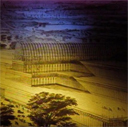0303 The Crystal Palace as the Parliament of Objects
On Alexander Kluge's Collage Film "The Power of Emotion"
Identifiers (Article)
Abstract
In a sequence dedicated to the London World’s Fair in his collage film The Power of Emotion (1983), Alexander Kluge talks about how the suppression of prudent proletarian emotion by the aesthetic staging and emotionalisation of exchange value corrupted the departure of industrial modernity into happiness and affluence. Correspondent to the mode of the opera, which originated concurrently with the "parliament of objects" as the "power plant of emotions", the fairytale-like beginning of the collage with the Great Exhibition in London in 1851 is followed by the Crystal Palace fire in 1937, with which the Reichstag fire of 1935 is associated. What is crucial is the portrayal of the workers Kluge’s montages feature as the 'real' builders of the Crystal Palace and of societal prosperity. The artisanal sensitivity with which bolt and nut are connected in such a way that the construction is stable represents a social utopia, which in view of its loss requires a response at the artistic level that is appropriate to the wartime destruction. The technological construction of aesthetic semblance has to be laid bare, the artistic form has to become iconoclastic.
Statistics


License

This work is licensed under a Creative Commons Attribution-NonCommercial-NoDerivatives 4.0 International License.



